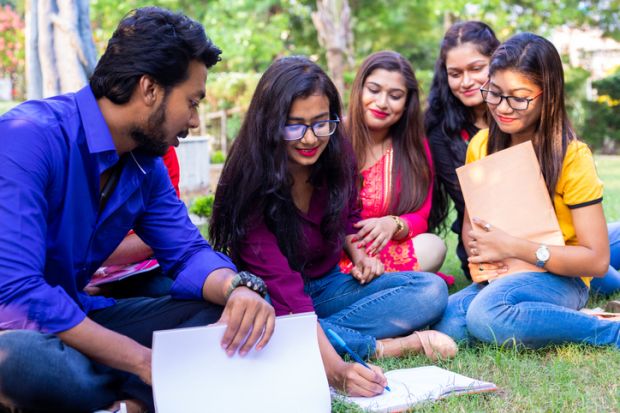With India gearing up for a massive overhaul of its education policy this year, academics are emphasising the need to inculcate a “research mindset” in students long before they pursue a doctoral degree.
The theme cropped up repeatedly during Times Higher Education’s India Universities Forum on 22 February in panels featuring scholars in the sciences as well as the social sciences and humanities.
“Research is a mindset,” said Dipak Jain, vice-chancellor of the Jio Institute, which was set up under India’s World Class Institutes programme and aims to become a fully fledged university in coming years.
“We don’t have to wait until you become graduate student [or] PhD student until you think of research,” he said. “This research culture needs to be embedded earlier.”
Dr Jain drew a comparison with US education, which, he said, does better at emphasising creativity and innovation – attributes that pupils will need if they pursue a career in academia.
“One thing that I found very unique in the US education system is that research starts from high school,” he told the audience of a panel on the future of Indian research universities. “My daughter, when she was in 11th or 12th grade, they were given a project where you work as a team. The school will say, ‘I’ll give you the funding; you need to come up with a plan.’”
By contrast, Indian high schools are “more focused on reproduction” – pupils’ ability to memorise and repeat back what they have learned, Dr Jain said.
Currently, research in India tends to be the domain of PhD students and those who already hold advanced degrees – but this is expected to change under the country’s National Education Policy, which is being rolled out this year.
“Right now, the research in India is done at post-postgraduate level, it means post-master’s level, but the policy says we should catch them young, so start from undergraduate level,” said Pankaj Mittal, secretary general of the Association of Indian Universities, which represents more than 800 institutions.
Under the National Education Policy, undergraduates will be encouraged to do research projects in their final year.
“For the first time in the policy, it is indicated that if somebody is doing a four-year undergraduate programme with research, they can stay in the PhD without a master’s,” said Dr Mittal. “So that is a very innovative step.”
Shakila Shamsu, an official in India’s Department of Higher Education who was speaking on a panel on liberal arts education, also stressed the need to develop innovative thinking early on.
“You can’t suddenly wake up one day and say that you’re going to be a researcher,” she said.
Instead, Indian secondary schools must kick-start the process by giving research projects to pupils “at class six onwards”, when students are aged 10 to 14, and undergraduate institutions should then “tone up” the skills they have gained.
Dr Shamsu acknowledged that findings by younger students might not rival those of their more experienced peers, but the research outputs were secondary to the benefit for learners, she explained.
“Research being germinated at undergraduate education might be very different from what we’ve seen in graduate and postdoctoral levels,” she said.
But first, students interested in becoming academics in the social sciences or the humanities need to surmount an even bigger barrier: the ongoing perception by Indian parents that the liberal arts are less practical than the sciences, and are a luxury reserved for the select few.
“We need to market that idea that it is not elitist,” she said, adding that parents need to be reassured that liberal arts education “is not going to render their youngster looking at a jobless future”.




